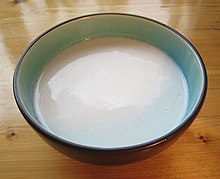
Back Plantmelk AF حليب نباتي Arabic Растително мляко Bulgarian Plantedrik Danish Pflanzliche Milch German Plantlakto EO Leche vegetal Spanish شیر گیاهی FA Kasvijuoma Finnish Lait végétal French
 | |
| Type | Non-dairy beverage and ingredient |
|---|---|
| Color | White |
| Flavor | Various; creamy texture |
| Ingredients | Water and a grain, pseudocereal, legume, nut, seed, or coconut |
Plant milk is a category of non-dairy beverages made from a water-based plant extract for flavoring and aroma.[1][2] Nut milk is a subcategory made from nuts, while other plant milks may be created from grains, pseudocereals, legumes, seeds or coconut. Plant-based milks are consumed as alternatives to dairy milk and provide similar qualities, such as a creamy mouthfeel,[3] as well as a bland or palatable taste. Many are sweetened or flavored (e.g., vanilla).
As of 2021, there were about 17 different types of plant milks, of which almond, oat, soy, coconut and pea are the highest-selling worldwide.[4][5] Production of plant milks—particularly soy, oat, and pea milks—can offer environmental advantages over animal milks in terms of greenhouse gas emissions and land and water use.[6]
Plant-based beverages have been consumed for centuries, with the term "milk-like plant juices" used since the 13th century. In the 21st century, one of these drinks is commonly referred to as a plant-based milk, alternative milk, non-dairy milk or vegan milk. For commerce, plant-based beverages are typically packaged in containers similar and competitive to those used for dairy milk, but cannot be labeled as "milk" within the European Union.[7]
Across various cultures, plant milk has been both a beverage and a flavor ingredient in sweet and savory dishes (such as the use of coconut milk in curries). These drinks are compatible with vegetarian and vegan lifestyles. Plant milks are also used to make ice cream alternatives, plant cream, vegan cheese, and yogurt-analogues (such as soy yogurt).[8] The global plant milk market was estimated to reach US$62 billion by 2030.[5]
- ^ Benjamin Kemper (15 August 2018). "Nut Milks Are Milk, Says Almost Every Culture Across the Globe". Smithsonian. Retrieved 20 March 2019.
- ^ Sethi, Swati; Tyagi, S. K.; Anurag, Rahul K. (2 September 2016). "Plant-based milk alternatives an emerging segment of functional beverages: a review". Journal of Food Science and Technology. 53 (9): 3408–3423. doi:10.1007/s13197-016-2328-3. ISSN 0022-1155. PMC 5069255. PMID 27777447.
- ^ Oliver Franklin-Wallis (29 January 2019). "White gold: the unstoppable rise of alternative milks". The Guardian. Retrieved 20 March 2019.
- ^ Megan Poinski (30 September 2020). "Oat milk surges to second most popular in plant-based dairy". FoodDive. Retrieved 21 August 2021.
- ^ a b Michael Browne (17 August 2021). "Plant-based foods are here to stay — and grow". Supermarket News. Retrieved 21 August 2021.
- ^ Cite error: The named reference
Holmeswas invoked but never defined (see the help page). - ^ "Dairy names for soya and tofu face new ban". 14 June 2017. Retrieved 8 June 2019.
- ^ Southey, Flora (11 May 2021). "'Vegurt' innovation: New cultures developed for fermented plant bases". Food Navigator.